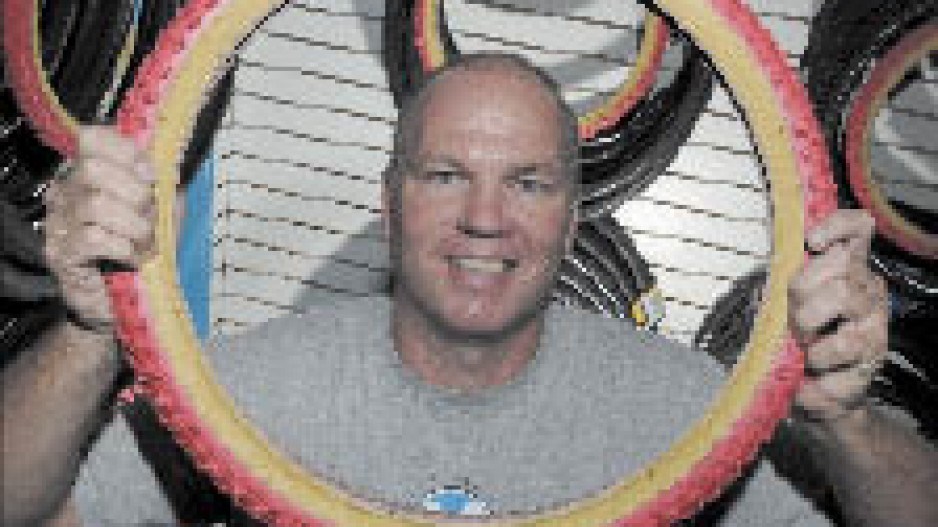While most people know to return their used car tires for recycling, bicycle tires often get tossed into the garbage and end up in the landfill.
Recently, the Tire Stewardship Council of BC (TSBC) announced a voluntary bicycle tire recycling initiative that adds to an existing car tire collection infrastructure managed by the council. With the help of Western Rubber Products (WRP), used bicycle tires and tubes can now be recycled with no eco-charge to the consumer or disposal fee for bike store owners.
“Bike tire and tube recycling is a great addition to our recycling program. It completes the life cycle of the product,” said Kirsten Blondal, sustainability co-ordinator for Mountain Equipment Co-op (MEC).
MEC encourages its employees to find new ways to recycle material. Its bicycle tire recycling program began a few years ago, and the TSBC initiatives enhance their ability to return more bicycle tires and tubes for recycling at no cost.
“Recycling fits into our sustainability mandate. Our employees are really engaged and excited to participate and initiate programs,” said Blondal. “Our bike tire recycling program was spearheaded by one employee that found a local plant that recycles the tires, which is pretty rare. He did his own research and originally loaded all the tires onto his own truck and personally took them to the plant.”
That plant is the Western Rubber Group in Delta. For approximately 12 years it has been the only recycling business in the area that takes bicycle tires from stores and repurposes them into different products. The rubber is processed into a range of finely ground crumbs and then manufactured into running tracks, anti-fatigue mats, railway ties, speed bumps, playground tiles and more. They used to charge a fee for recycling as mandated by the TSBC until it lifted those fees.
This is welcome news to people like Bob Heilker, manager of Different Bikes in Vancouver, a chain of four stores. Each day, cyclists come into his store to have flat tires repaired after run-ins with glass or other debris on the road or riding with under-inflated tires.
“I take tires in for repairs and for those that can’t be repaired, I take away for recycling,” said Heilker. “There are so many used tires that come into the shop that I don’t want to end up in the garbage. It hasn’t been a consumer-driven initiative but it’s something I do to get rid of them in an environmentally responsible way.”
In a week, staff members collect between 25 and 40 tubes and about 10 to 15 tires in the busy summer season. Different Bikes uses a delivery van to drop them off at Urban Garage in West Vancouver to be taken away for recycling.
Stores are given specific instructions on how to prepare the tires and tubes for recycling. It can be a time-consuming process but MEC employees have adopted it into their daily tasks.
“We have such a high level of commitment from our staff members,” said Blondal. “This is a task that the MEC employees take on that shows how committed everyone is to sustainability and what they do to make it happen.”
For 1-800-GOT-JUNK, recycling and diverting appropriate materials from the landfill are its mandate. “We try to recycle bikes or donate them to the BC Development Disabilities group,” said Richard Bender, owner, 1-800-GOT-JUNK Vancouver.
“Rubber is brutal on the environment. If we get bicycles then we can reuse it and donate it. If not, we separate the different materials for recycling.”
Bender noted there is a growing awareness about the company’s recycling program that has become a main reason many customers use 1-800-GOT-JUNK. “We offer recycling as part of our service and divert appropriate materials. We track recycling and have diverted 61% of items from the landfill. Our goal is to reach 80%.”
He added, “It is a function of our resources to get rid of recyclable items in a timely manner. We get about four to five bikes a week and recycle the different parts if they are not salvageable for donation. We take the tires to gas stations and stores like Canadian Tire. It’s an opportunity to raise awareness to point-of-sale locations.”
For MEC members in Vancouver and North Vancouver, a bright pylon with a sign next to the front doors continues to spread the word about the bicycle tire recycling program.
“The container fills up quickly,” said Blondall. “It is a hugely popular program; our issue now is finding storage space for all the tires.” •




